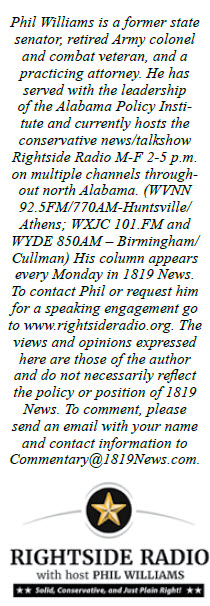 By: Phil Williams
By: Phil Williams
Something new and different happened in a recent congressional hearing that turned an otherwise mundane committee meeting into a total goat rodeo.
The purpose of the hearing was to receive testimony on the U.S. government’s collaborative effort with Big Tech to censor people who dared to speak against “approved narratives.” Intended as a hearing on censorship, several witnesses were sworn in to testify, all of whom had been censored themselves. Democratic committee members did not want the testimony heard, so a motion was made by Democratic Congresswoman Debbie Wasserman-Schultz to move into executive session in order to keep the hearing out of the public eye.
Did you catch that? In a hearing about censorship Democrats tried to censor the censored about their views on censorship. You can’t make this stuff up. The effort failed, but the point remains that when government is allowed to control the public discourse, the path inevitably leads to tyranny.
But what liberal Democrats did not see coming in the recent hearing was that one of their own was going to hand them a heaping ration of pain and discomfort. One of those witnesses was none other than Robert F. Kennedy Jr., son of the late Bobby Kennedy, nephew of President John F. Kennedy, and a current Democratic candidate for president.
They tried to quash his comments. They tried to cut him off. They tried to defame his character and misrepresent his prior comments, and he was having none of it.
With his opening comments, RFK Jr. addressed the fact that 102 Democratic lawmakers had signed a letter calling on the Speaker of the House to disinvite him to speak. Holding up a copy of the letter RFK Jr. said, “My fellow Democrats, I’ve spent my life in this party. I’ve devoted my life to the values of this party. This itself is evidence of the problem that this hearing was convened to address. This is an attempt to censor a censorship meeting.” He went on to say, “Censorship is anathema to our party. It was appalling to my father, to my uncle, to FDR, to Harry Truman, to Thomas Jefferson…it is the basis for democracy…the first amendment was not written for easy speech. It was written for the speech that no one likes you for.”
 Congressional Democrats should take note of British scholar and author Salman Rushdie. In 1988, Rushdie wrote a novel called The Satanic Verses. Deemed an affront to the Muslim faith for its alleged portrayal of the Islamic prophet Mohammed, the outcry from the Islamic world was significant. The book was banned in several Islamic nations and considered off limits by Muslim clerics. But in 1989, things ramped up to a new and very dangerous level when Iranian Supreme Leader Ayatollah Khomeini issued a fatwa calling for Rushdie’s execution and putting a $3million worldwide bounty on his life. The leader of a sovereign nation had called for Muslims everywhere to kill a man for daring to write a book. It was government action at its worst.
Congressional Democrats should take note of British scholar and author Salman Rushdie. In 1988, Rushdie wrote a novel called The Satanic Verses. Deemed an affront to the Muslim faith for its alleged portrayal of the Islamic prophet Mohammed, the outcry from the Islamic world was significant. The book was banned in several Islamic nations and considered off limits by Muslim clerics. But in 1989, things ramped up to a new and very dangerous level when Iranian Supreme Leader Ayatollah Khomeini issued a fatwa calling for Rushdie’s execution and putting a $3million worldwide bounty on his life. The leader of a sovereign nation had called for Muslims everywhere to kill a man for daring to write a book. It was government action at its worst.
Bookstores were bombed, Rushdie had to hire private security, and he was placed on Al-Qaeda’s hit list. But for the last 35 years, Rushdie has refused to remain silent, at great risk to his own life. More than once he had to cancel events because of threats. In 2022, Rushdie was just beginning a lecture in Chautauqua, New York, when a Lebanese immigrant named Hadi Matar ran onto the stage and stabbed Rushdie repeatedly in the neck and abdomen. Rushdie was saved after major surgery, but he has lost the permanent use of one hand and an eye.
A government decree against a private citizen in another country was issued without due process just to silence words that the leader did not like. That decree lingered for over three decades resulting in violence against the speaker. This is censorship at its most extreme level. Not just the suppression of the voice, but the actual attempt to kill the person whose voice was considered objectionable.
Some may say that there is no direct comparison between the fatwa on Rushdie and the hearing that was held in the U.S. Congress. Or is there?
The attempt to censor that congressional hearing was something that if not prevented at its current level, would only grow and fester. You see, the fatwa issued by the ayatollah was not something that happened overnight. It was something that developed over time as barriers to decency and common sense were slowly eroded. There was a gradual degradation of the value of freedom and liberty, with a belief that the words of the one must be kept from the many because of the fear of the few.
Keep in mind that Rushdie was not stabbed in Iran. He was stabbed in the U.S. Evil has a way of spilling across borders. Too often the left doesn’t care about your views. They only care that they have a view and would prefer that you be silenced to avoid your view blocking their own.
RFK Jr. was right. We cannot be a free nation if the very first of our civil liberties, the freedom of speech, can be so easily abridged. What good is freedom without expression? Are you really free if government is able to decide that your views don’t count and stifles your ability to talk, write, give speeches, or to have an opinion?
The Iranian ayatollah called for Muslims around the world to kill a man who said something that he found objectionable. Democrats in Congress chose to try to defame and stifle a man for having opinions they found objectionable. How different are those two things? I submit that one is just a more advanced version of the other.
By: Phil Williams





